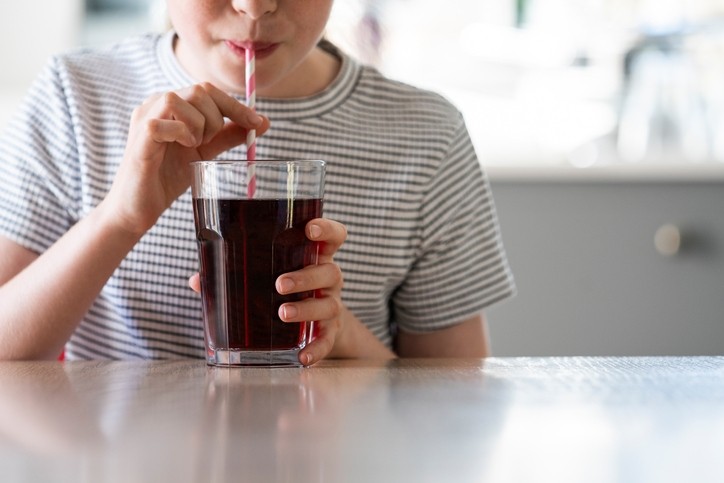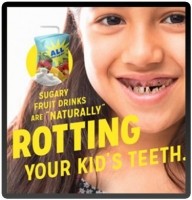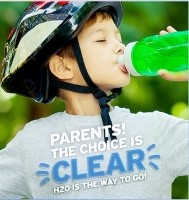Anti-smoking style warnings on kids’ sugar-sweetened fruit drinks reduce purchases: study

Published in the American Journal of Public Health, the study assessed the use of stark anti-smoking style campaigns: which presented messages such as ‘Sugary fruit drinks are ‘naturally’ rotting your kid’s teeth’.
The study focused on Latinx parents, given that Latinx children have a high rate of sugary drink consumption.
Anti-smoking style health messages
Unlike 100% fruit juice, a ‘fruit drink’ is a fruit-flavored beverage containing added sugar.
Branding and marketing, however, still seeks to create a ‘health halo’ around their products through the association with fruit juice.
Ads, labels and even online games and cartoons used to promote kids’ drinks often contain claims about nutrients such as vitamin C, and images of healthy kids drinking products while participating in sports.
For their study, researchers created countermarketing graphics and messages in English and Spanish, guided by a Latinx marketing firm and Facebook focus groups.
In the same way as anti-smoking ads, these messages were designed to ‘elicit outrage, fear of the harmful effects on children and other negative emotions’.
This was primarily done by describing the possible adverse effects of sugary products on children's health.
The researchers then enrolled 1,628 Latinx parents — predominantly female and from lower-income households — to participate in Facebook groups for six weeks.
The aim of the study was to assess the impact of such countermessages on parents’ beverage choices; as well as better understanding how parents perceive fruit drinks.
Purchases declined 43%
In the study, parents were divided into three groups:
- the first saw fruit drink countermessages only;
- a second saw both countermessages and water promotion messages;
- and a control group saw safety messages about car seats.
All parents were then sent to an online store where they shopped for kids’ drinks, receiving money to buy these drinks in a real store.
Parents who saw countermarketing messages were less likely to buy a fruit drink and more likely to buy water.
Those in the first fruit-drink countermarketing group decreased their virtual purchases of these drinks by 31% compared to the control group.
In the second group, which received both countermarketing messages and water promotional materials, virtual purchases of fruit drinks declined 43% and water was purchased more often than in the first group.
As a result, researchers estimate that children in this second group consumed 22% less added sugar than average 2-5 year olds.
Emotive messages
The researchers drew on anti-tobacco messages and the words and types of images they use because of their strong emotive effect, said James Krieger, lead author and clinical professor of health systems and population health in the UW School of Public Health.
“We wanted messages that would appeal to folks on an emotional level as well as a cognitive one, because that’s what research shows drives people to make choices,” he explained.
As well as reducing purchases, such messages also resulted in parents being ‘significantly’ less likely to trust fruit drink brands, according to exit polls among the intervention groups.
Focus groups were also asked for their perceptions of how marketing works.
“They know that targeted marketing happens all the time in the digital era, but what really got them was the fact that they were given deceptive information that they felt was leading them to make unhealthy choices on behalf of their kids,” Krieger said.
The researchers say their study is the first to demonstrate the efficacy of countermessages delivered solely via social media as well as the first to specifically target sweetened beverage consumption among young children.
As a result of this study, they have created a social media countermarketing toolkit for use by anyone to campaign against fruit drink purchases for children.
Source: 'Countermarketing About Fruit Drinks, Alone or With Water Promotion: A 2019 Randomized Controlled Trial in Latinx Parents'. James KriegerMD, MPH, Taehoon KwonPhD, Rudy RuizMPP, Lina Pinero WalkinshawMPH, Jiali YanMS, and Christina A. RobertoPhD. American Journal of Public Health, published October 28, 2021. https://doi.org/10.2105/AJPH.2021.306488






